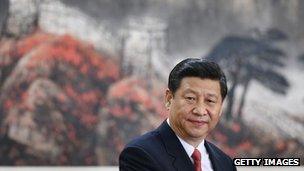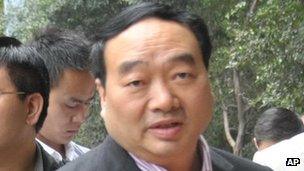How serious is China on corruption?
- Published

Xi Jinping reiterated the importance of fighting corruption
Even among China's jaded internet users, this was big news: Li Jianguo, a Communist official operating at the very top of the party, was under investigation for corruption.
Mr Li, who serves as vice chairman of China's parliament, reportedly engineered the promotion of his nephew to a plum government position.
In October, Mr Li was promoted to join China's elite 25-member Politburo. Now, the Hong Kong media reports he has checked into a Beijing military hospital, suffering from stress.
If Chinese investigators are pursuing a case against Li Jinguo, he has good reason to be worried. China's new Party leader, Xi Jinping, vowed to crack down on corruption in his first speech to the public in October and so far, he appears to be keeping his word.
Just last week, Mr Xi promised he would battle both "tigers" and "flies", indicating that officials at all ranks were under scrutiny.
Li Xinde, an influential citizen journalist, was the first person to interview the whistleblower exposing Li Jianguo's high-flying nephew. The fact that this case has been picked up by the authorities, he says, shows that things are changing in China.
"When Xi came into power, people were accustomed to ineffective anti-corruption campaigns," Li Xinde explains.
"They're usually characterised by lots of words and few actions, or 'big thunder, small rain', but this time, Xi's speeches have produced real results."
Li is a common surname in China and the two Lis are unrelated.
The blogger, Li Xinde, also points to a second case, the downfall of China's "Housing Sister", to underline the fact that this time, the Party is serious about tackling corruption. Gong Ai-ai is believed to have illegally purchased more than 20 units of China's so-called affordable housing, building up a portfolio worth $159m (£100m).

Lei Zhengfu was sacked after a sex video was released exposing a blackmail scandal
"These cases were successful not only because Chinese internet users exposed them, but also because the Party acted so swiftly to deal with it," Mr Li says.
All evidence, he says, that individual citizens are no longer working alone to expose corruption on a case-by-case basis. Instead, there is new hope that the system as a whole is becoming more transparent.
'Edge of a knife'
More transparent, maybe. But the Chinese government won't become clean up overnight. Chinese citizens are pressuring Xi Jinping to crack down on corruption or he could quickly lose their support. But if Mr Xi pushes his Communist cronies to give up the perks of power too quickly, he also risks losing the loyalty of those who keep him in China's top job.
Another depressing point say campaigners: Xi Jinping rose through the same corrupt system as his hospitalised colleague, Li Jianguo. A Bloomberg investigation last year, external said that Mr Xi's family have profited from their association to him, holding an estimated $376m in assets.
No assets were traced to Mr Xi, his wife or daughter, the investigation said, adding that there was no indication of wrongdoing by Mr Xi or his family or that he intervened to advance relatives' business interests.
Needless to say, China's anti-corruption campaign has a long way to go. In December, China fell to the 80th spot out of 176 countries rated for their perceived levels of corruption on the annual global ranking, external by Berlin-based NGO Transparency International. China scored 39 out of a possible 100 points, behind countries like South Africa and Italy.
Grassroots anti-corruption campaigners like Li Xinde and his colleagues still operate in a legal grey zone. Mr Li admits that he has to "dance on the edge of a knife" when writing about local officials, in case his efforts to battle corruption land him in hot water.
Just on Monday morning, Zhu Ruifeng, the blogger who publicised a sex scandal in Chongqing, was summoned to a local Beijing police station. In November, he released a video depicting a high-ranking official having sex with a young girl. That video exposed a blackmail scandal that lead to the eventual arrest of 11 high-ranking city officials.
When contacted by phone, a friend of Mr Zhu, surnamed Gao, told the BBC that Mr Zhu had been talking to police inside the station for hours. He was first visited at home by five uniformed police from Chongqing the night before, but refused to leave his home.
It was unclear whether Mr Zhu was being charged with any wrongdoing, though Mr Gao believed that Zhu was probably under pressure to release additional sex videos he had obtained from Chongqing. Those videos, Mr Zhu told us in November, protected him from persecution by the government because they depicted other Chinese officials engaging in sex.
The Chinese public's thirst for blood in chasing corrupt officials could provide Mr Zhu with an even greater level of protection. Li Xinde says he has never seen Chinese citizens so determined to clean up the Party. This time, they won't allow Mr Xi or his comrades to back down from their promises.
- Published25 January 2013
- Published28 November 2012
- Published9 November 2012
- Published5 December 2012